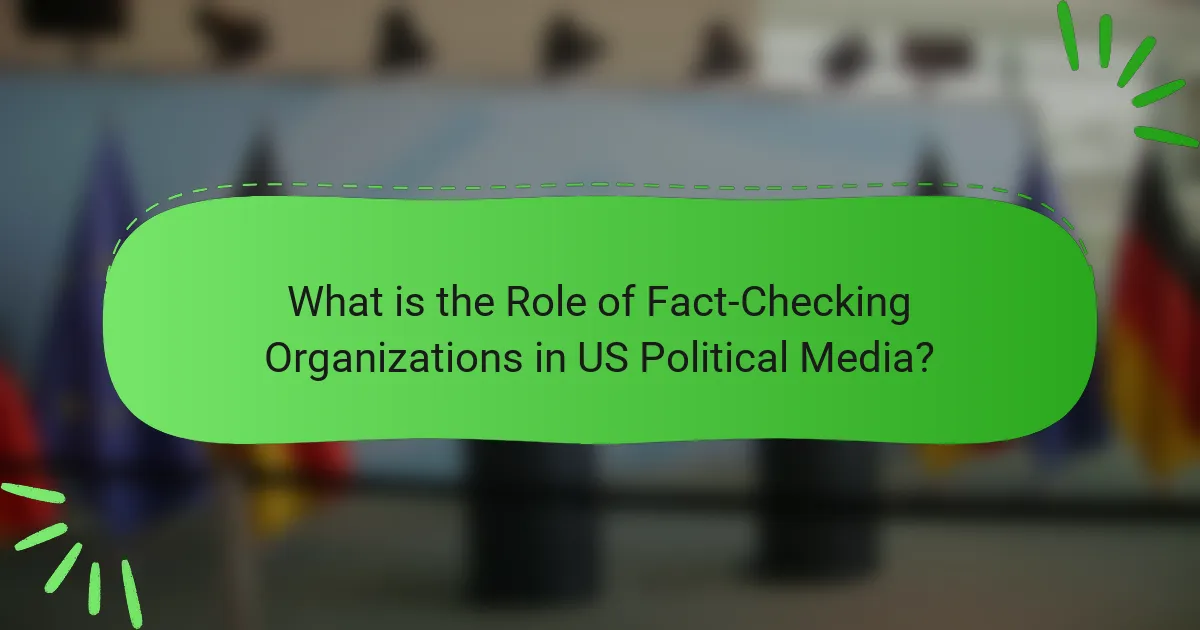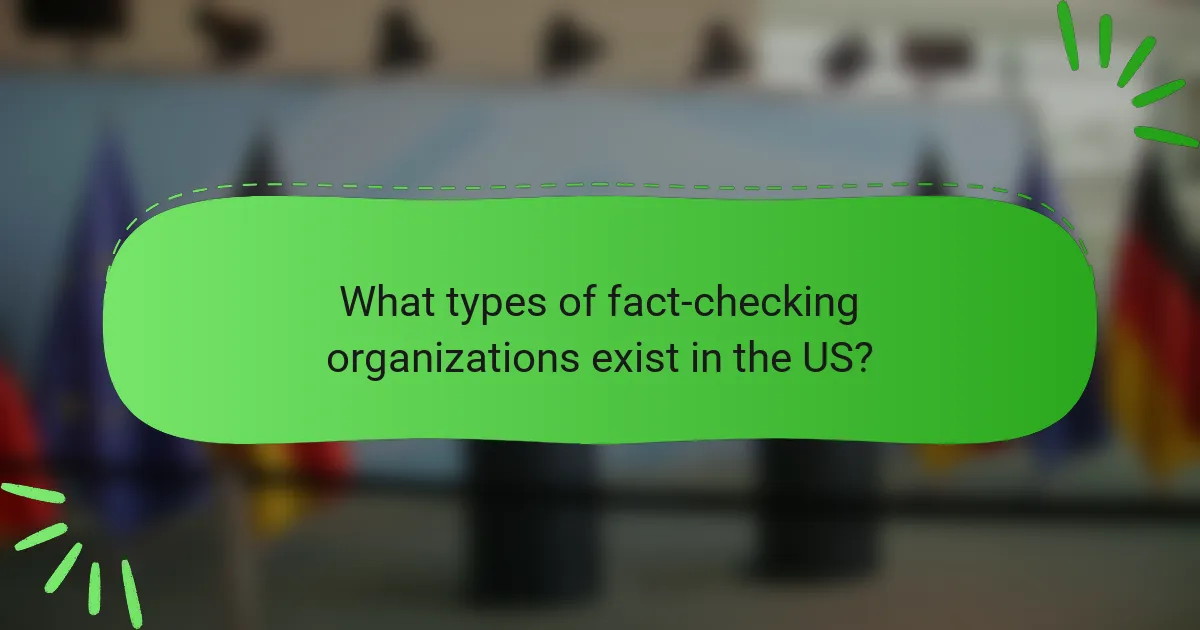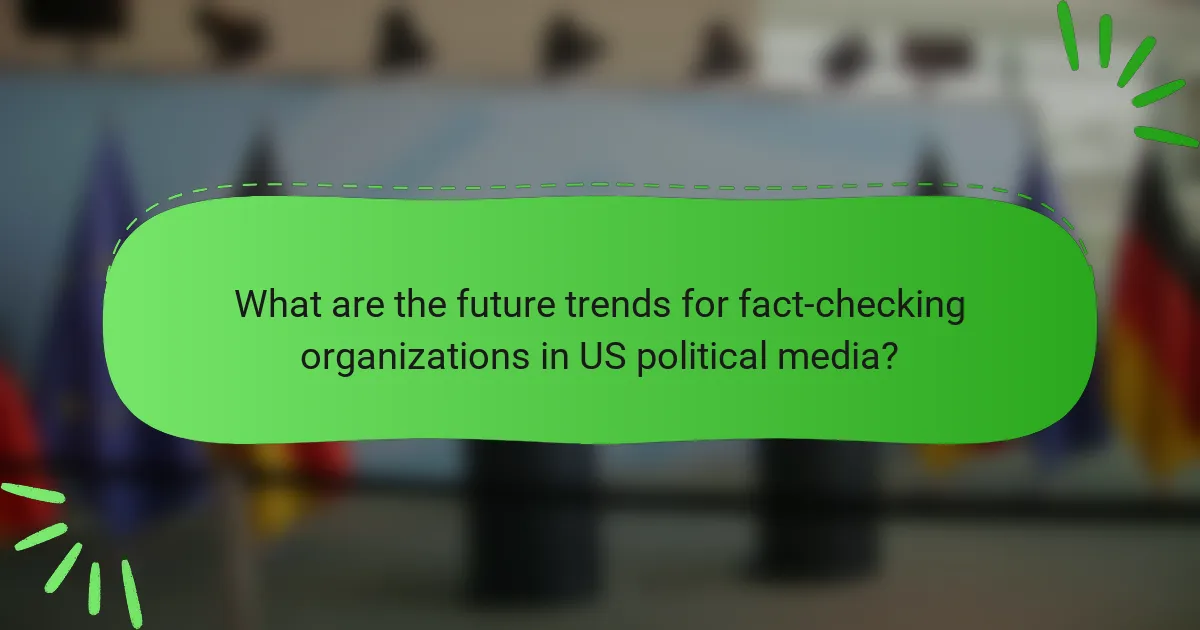Fact-checking organizations are essential entities in US political media, responsible for verifying claims made by public figures and media outlets. They assess the accuracy of political statements and play a vital role in combating misinformation and disinformation. Prominent organizations such as PolitiFact, FactCheck.org, and Snopes, alongside internal teams from news organizations and academic initiatives, contribute to promoting accuracy in media. The article highlights the increasing reliance on technology and data analytics in fact-checking, the importance of transparency, and the growing public demand for accountability in political discourse. It also discusses the potential for collaboration among fact-checkers and the need for adaptability to evolving media landscapes.

What is the Role of Fact-Checking Organizations in US Political Media?
Fact-checking organizations play a crucial role in US political media by verifying claims made by public figures and media outlets. They assess the accuracy of statements related to political issues and campaigns. This process helps to combat misinformation and disinformation in the political landscape. For instance, organizations like PolitiFact and FactCheck.org evaluate statements and provide ratings based on their truthfulness. Their findings are often cited by journalists and used to inform the public. According to a 2020 study by the Pew Research Center, 75% of Americans say fact-checking is important for democracy. This indicates a strong public demand for accountability in political discourse.
How do fact-checking organizations operate within the political media landscape?
Fact-checking organizations operate by verifying claims made in political discourse. They analyze statements from politicians, media, and public figures for accuracy. This process involves researching facts, reviewing evidence, and consulting experts. Organizations like PolitiFact and FactCheck.org utilize a systematic approach to assess claims. They categorize findings as true, false, or misleading. Their work aims to promote transparency and accountability in political communication. Furthermore, they provide accessible explanations to educate the public. By doing so, they contribute to informed citizenry and a healthier democratic process.
What processes do these organizations use to verify information?
Fact-checking organizations use a variety of processes to verify information. They typically begin by identifying claims that require verification. Next, they gather evidence from credible sources such as academic studies, official documents, and expert interviews. Fact-checkers assess the reliability of these sources based on established criteria. They then analyze the data to determine the accuracy of the claims. After thorough examination, they provide a verdict, often accompanied by detailed explanations. This method ensures transparency and accountability in their findings. For instance, organizations like PolitiFact and FactCheck.org have established guidelines for evaluating claims, enhancing their credibility in the political media landscape.
How do fact-checking organizations determine what to fact-check?
Fact-checking organizations determine what to fact-check based on various criteria. They prioritize claims that are widely circulated and have significant public impact. This includes statements made by public officials, political candidates, and media outlets. Organizations also consider the potential for misinformation and its consequences. They analyze social media trends and audience requests for clarification. Additionally, factual accuracy and the relevance of the claim to current events are key factors. Research indicates that high-profile claims are more likely to be scrutinized. For example, a study by the Pew Research Center found that fact-checking is often focused on statements that could influence public opinion or policy.
Why are fact-checking organizations important in political media?
Fact-checking organizations are important in political media because they ensure the accuracy of information disseminated to the public. They verify claims made by politicians and media outlets. This verification process helps combat misinformation and disinformation. For instance, during the 2020 U.S. election, fact-checkers identified numerous false statements from various political figures. Their findings were crucial in informing voters about the truth. Studies show that fact-checking can influence public perception and trust in media. According to a 2020 Pew Research Center study, 64% of Americans believe fact-checking is essential for a healthy democracy. Thus, their role is vital for maintaining informed citizenry and accountability in political discourse.
What impact do they have on public perception of political information?
Fact-checking organizations significantly influence public perception of political information. They enhance trust in media by verifying claims made by politicians and public figures. When these organizations provide accurate assessments, they help reduce misinformation. Studies indicate that fact-checking can shift public opinion by correcting false narratives. For instance, a 2017 study by the Pew Research Center found that 63% of Americans believe fact-checking improves the accuracy of political discussions. Additionally, fact-checking organizations often highlight discrepancies in political statements, leading to increased scrutiny from the public. This scrutiny encourages politicians to be more accountable. Overall, their presence promotes a more informed electorate.
How do they contribute to accountability in journalism?
Fact-checking organizations contribute to accountability in journalism by verifying claims made by public figures and media outlets. They analyze statements against factual evidence. This process helps to identify misinformation and disinformation. By providing accurate information, they promote transparency in political discourse. For instance, studies show that fact-checking can reduce the spread of false information. A 2017 study by the Pew Research Center found that fact-checking increases public awareness of misinformation. Their work encourages journalists to adhere to higher standards of accuracy. Overall, these organizations play a critical role in fostering trust in journalism.
What challenges do fact-checking organizations face?
Fact-checking organizations face several significant challenges. One major challenge is the rapid spread of misinformation across various media platforms. This makes it difficult to keep up with the volume of false claims. Additionally, fact-checkers often encounter a lack of resources. Many organizations operate with limited funding and staff, which hampers their ability to conduct thorough investigations.
Another challenge is the political bias perceived in their work. Some audiences may distrust fact-checkers if they believe the organizations favor one political perspective over another. Furthermore, fact-checkers struggle with the evolving nature of misinformation. Tactics used to spread false information continually change, requiring constant adaptation from fact-checking organizations.
Finally, there is the challenge of audience engagement. Many people may not seek out fact-checking resources, limiting the impact of their work. These challenges collectively hinder the effectiveness of fact-checking organizations in combating misinformation in US political media.
How do misinformation and disinformation affect their work?
Misinformation and disinformation significantly hinder the work of fact-checking organizations. These entities strive to provide accurate information to the public. However, they face the challenge of constantly debunking false claims. A study by the Pew Research Center found that 64% of Americans believe misinformation has a major impact on their understanding of current events. This complicates the fact-checkers’ role, as they must not only verify facts but also combat widespread false narratives. Additionally, misinformation can erode public trust in media sources. When audiences are exposed to conflicting information, they may become skeptical of legitimate reporting. Thus, misinformation and disinformation create an ongoing obstacle for fact-checking organizations in fulfilling their mission.
What are the limitations of fact-checking in political reporting?
Fact-checking in political reporting has several limitations. One major limitation is the potential for bias. Fact-checkers may have their own political leanings, which can influence their assessments. Additionally, fact-checking often relies on the availability of verifiable information. In some cases, information may be incomplete or difficult to verify.
Another limitation is the complexity of political statements. Many statements are nuanced or context-dependent, making them challenging to evaluate accurately. Furthermore, the rapid pace of political discourse can outstrip the ability of fact-checkers to respond timely. This delay can render fact-checks less relevant in fast-moving news cycles.
Lastly, public perception plays a role. Some audiences may dismiss fact-checking efforts, viewing them as partisan or untrustworthy. This skepticism can undermine the effectiveness of fact-checking in promoting informed public discourse.
How do fact-checking organizations collaborate with other media entities?
Fact-checking organizations collaborate with other media entities through partnerships and resource sharing. They often provide verification services to news outlets. This collaboration enhances the credibility of reporting. For instance, organizations like PolitiFact and The Washington Post work together on fact-checking political claims. They share methodologies and data to improve accuracy. Additionally, many fact-checkers contribute to joint initiatives, such as the International Fact-Checking Network. This network promotes best practices among media entities. Collaborative efforts also include training journalists in fact-checking techniques. Overall, these partnerships strengthen the integrity of political media.
What role do technology and social media play in fact-checking?
Technology and social media play a crucial role in fact-checking by facilitating the rapid dissemination of information. Social media platforms enable users to share news and claims instantly. This immediacy allows fact-checkers to identify misinformation quickly. Technology tools, such as algorithms and machine learning, assist in detecting false information patterns. For instance, automated systems can flag potentially misleading content for further review. Social media also provides a space for public engagement with fact-checking efforts. Users can interact with fact-checkers and share their findings. According to the Pew Research Center, 64% of Americans believe that fact-checking helps them discern credible news. This highlights the importance of technology and social media in enhancing public awareness of misinformation.

What types of fact-checking organizations exist in the US?
There are several types of fact-checking organizations in the US. These include independent non-profit organizations. Prominent examples are PolitiFact, FactCheck.org, and Snopes. Some news organizations also have internal fact-checking teams. These teams verify information before publication. Academic institutions may also engage in fact-checking initiatives. Each type plays a role in promoting accuracy in media. They contribute to informed public discourse by identifying misinformation.
How do independent fact-checkers differ from those affiliated with media outlets?
Independent fact-checkers operate independently from media outlets, while affiliated fact-checkers are part of these organizations. Independent fact-checkers prioritize impartiality and may have no financial ties to specific media interests. They often rely on diverse sources and methodologies to evaluate claims. In contrast, affiliated fact-checkers may be influenced by their media outlet’s editorial policies and audience. This can affect their objectivity and the scope of their fact-checking. Research indicates that independent fact-checkers often have a broader focus on various claims, while affiliated fact-checkers may concentrate on issues relevant to their outlet’s audience. This distinction is crucial for understanding potential biases in fact-checking.
What are the characteristics of independent fact-checking organizations?
Independent fact-checking organizations are characterized by their commitment to impartiality, transparency, and accuracy. They adhere to a strict methodology for evaluating claims. This often includes sourcing information from credible and verifiable sources. Independent fact-checkers typically disclose their funding sources to maintain transparency. They also publish their findings in an accessible manner to inform the public. Many organizations are members of professional associations that uphold ethical standards. These organizations often collaborate with journalists to enhance the quality of information. Their work is essential for promoting accountability in public discourse.
How do affiliated fact-checkers maintain their credibility?
Affiliated fact-checkers maintain their credibility through transparency, accuracy, and adherence to journalistic standards. They disclose their methodologies and sources to the public. This openness allows users to verify their claims. Fact-checkers also rely on data from reputable sources, ensuring their information is accurate. They undergo regular reviews and audits by independent organizations. These evaluations help maintain high standards and accountability. Additionally, many affiliated fact-checkers are part of networks, such as the International Fact-Checking Network, which promotes ethical guidelines. By following these practices, they build trust with audiences and enhance their credibility.
What methodologies do different fact-checking organizations use?
Different fact-checking organizations use various methodologies to assess the accuracy of claims. Common methodologies include sourcing, context evaluation, and evidence verification. Organizations often rely on primary sources, such as official documents and expert interviews. They also compare claims against established facts and statistical data. Some organizations use a rating system to categorize the accuracy of statements. For instance, PolitiFact employs a Truth-O-Meter to rate claims from “True” to “Pants on Fire.” FactCheck.org emphasizes transparency by providing citations for their conclusions. Additionally, some organizations utilize crowdsourcing to gather public input or additional evidence. These methodologies help ensure that the fact-checking process is systematic and reliable.
How does the choice of methodology influence their findings?
The choice of methodology significantly influences the findings of fact-checking organizations. Different methodologies can lead to varying interpretations of the same data. For instance, qualitative methods may provide in-depth insights into context, while quantitative methods yield statistical data. A study by the Pew Research Center shows that fact-checking approaches affect public perception of political claims. Methodologies that emphasize transparency can enhance credibility. Conversely, opaque methods may lead to skepticism among audiences. Thus, methodology shapes not only results but also the trustworthiness of the findings.
What are the most common standards for fact-checking?
The most common standards for fact-checking include accuracy, transparency, and accountability. Accuracy ensures that the information is correct and verifiable. Transparency involves disclosing sources and methodologies used in the fact-checking process. Accountability means that fact-checkers are responsible for their conclusions and can be challenged or corrected. These standards help maintain credibility and trust in the fact-checking process. Organizations like PolitiFact and FactCheck.org adhere to these principles to uphold their integrity.

What are the future trends for fact-checking organizations in US political media?
Fact-checking organizations in US political media are expected to increasingly leverage technology and data analytics. Automation tools will enhance fact-checking efficiency and accuracy. Artificial intelligence will assist in identifying misinformation trends. Collaboration among fact-checkers will likely grow to combat widespread false narratives. Transparency in methodologies will become more crucial for maintaining credibility. Increased public awareness of misinformation will drive demand for fact-checking services. Funding from diverse sources may improve sustainability and reach. Overall, adaptability to evolving media landscapes will be essential for these organizations.
How is technology shaping the evolution of fact-checking?
Technology is significantly shaping the evolution of fact-checking. It enhances the speed and accuracy of verifying information. Automated fact-checking tools analyze data at unprecedented rates. These tools utilize algorithms to assess claims against verified sources. AI-driven systems can identify false information in real time. Social media platforms integrate fact-checking features to combat misinformation. Additionally, crowdsourcing allows users to contribute to fact-checking efforts. Research indicates that technology increases public awareness of misinformation. For instance, a study by the Pew Research Center shows that fact-checking tools improve users’ ability to discern credible information.
What innovations are being introduced to improve accuracy and efficiency?
Innovations improving accuracy and efficiency in fact-checking organizations include advanced AI algorithms. These algorithms analyze large datasets to identify misinformation patterns. Machine learning models are trained on past fact-checks to enhance predictive accuracy. Real-time monitoring tools enable immediate detection of false claims. Collaborative databases allow organizations to share findings and resources. Automated verification processes reduce human error and speed up fact-checking. Enhanced user interfaces improve accessibility for both fact-checkers and the public. These innovations collectively enhance the reliability of information in political media.
How might artificial intelligence impact fact-checking processes?
Artificial intelligence can significantly enhance fact-checking processes. AI algorithms can analyze vast amounts of data quickly. They can identify patterns and discrepancies in information. This leads to faster detection of false claims. Machine learning models can improve accuracy over time. They learn from previous fact-checking efforts. AI tools can assist human fact-checkers by providing relevant context. This reduces the workload on fact-checking organizations. A study by the Pew Research Center indicates that AI can improve efficiency in media organizations. Overall, AI’s integration into fact-checking can foster a more informed public.
What best practices should fact-checking organizations adopt?
Fact-checking organizations should adopt transparency, accuracy, and accountability as best practices. Transparency includes clearly disclosing sources and methodologies. This builds trust with the audience. Accuracy requires rigorous verification of claims before publication. Fact-checkers must cross-reference multiple reliable sources. Accountability involves correcting errors promptly and publicly. This fosters credibility and reliability. Additionally, engaging with the audience enhances understanding of fact-checking processes. Many successful organizations, like PolitiFact, exemplify these practices, reinforcing the importance of integrity in political media.
How can fact-checkers enhance their transparency and trustworthiness?
Fact-checkers can enhance their transparency and trustworthiness by clearly disclosing their methodologies. This includes explaining how claims are evaluated and the sources used in their assessments. Additionally, fact-checkers should publish their funding sources to avoid conflicts of interest. They can also provide access to their databases for public scrutiny. Engaging with the audience through feedback mechanisms can further build trust. Regularly updating their findings based on new evidence shows commitment to accuracy. Furthermore, collaborating with other reputable organizations enhances credibility. These practices are supported by studies indicating that transparency increases public trust in information sources.
What strategies can they use to engage the public effectively?
Fact-checking organizations can engage the public effectively through transparency, accessibility, and collaboration. Transparency involves openly sharing methodologies and sources. This builds trust with the audience. Accessibility includes using simple language and various formats, such as videos and infographics. These formats cater to different learning preferences. Collaboration with media outlets enhances reach and credibility. Engaging in social media discussions allows for real-time interaction. Hosting community events fosters direct engagement and dialogue. Research shows that these strategies increase public awareness and trust in fact-checking efforts. A study by the Pew Research Center indicates that transparency significantly boosts audience trust in information sources.
Fact-checking organizations are essential entities in US political media, tasked with verifying claims made by public figures and media outlets to combat misinformation and disinformation. This article examines their operational processes, methodologies, and the impact they have on public perception and accountability in journalism. It addresses challenges faced by these organizations, including the rapid spread of misinformation and perceived bias, while highlighting future trends such as the integration of technology and AI. Additionally, the article explores the characteristics of independent and affiliated fact-checkers, their collaboration with media entities, and best practices for enhancing transparency and public engagement.